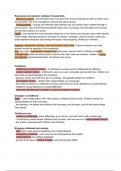Resources and decision making in households
- Allowance system - (functionalist view) men give their wives an allowance with no limit to care
for the family. The men manage the amount they get to spend.
- Pooling system - (young and willmott) both partners can use money when needed through a
joint account - also a feminist/symmetrical family view. In pooling, men still make more money
so they still control it in a sense.
Edgell - men decide the most important decisions in the family (new houses, jobs), both parents
make middle important decisions (schools for children, holidays), and the woman makes the
least important decisions (decorating the house, food shopping, clothing for children)
Parsons - expressive (women), and instrumental (men) roles. Parsons believes men and
women should be separate in the household.
Bott -two roles - segregated conjugal roles (men work, women care for children) and joint
conjugal roles (both can either work or care for the child, roles are shared) - relates to young
and willmott (symmetrical families, should be more even)
Childhood
- childhood is a social construct - it's decided by society and all childhoods are different.
- modern western society - childhood is seen as a very vulnerable and sacred time; children are
also seen as psychologically and immature.
- going to school, the stuff they eat, no working - all separate adults from children.
- non-western society - children take responsibility at a young age.
- less value is placed on childhood, and they don't show as much obedience to adult authority.
- childrens’ sexual behavior is viewed differently
- adult and child behavior is similar in some non-western societies.
Changes in childhood:
Aries - in the middle ages (10th-13th century), childhood did not exist. Children weren't as
distinguishable as they are today.
- the painting - the adults and children look the same, act the same, and do the same things.
“Mini adults”
Childhood now:
- children act differently, dress differently, go to school, and can't work until a certain age.
- “moved from a world where childhood did not exist, and now we're in a child-centered society”
- the world is obsessed with children and childcare.
Bringing childhood into society:
- laws were made around childlabour and child protection
- compulsory schooling - main way they are distinguished from adults
- child protection and welfare legislation
- growth of the idea of children's rights - now having basic rights




